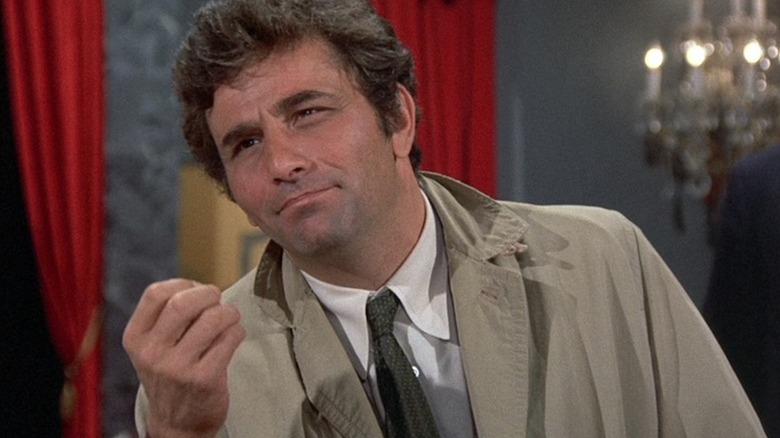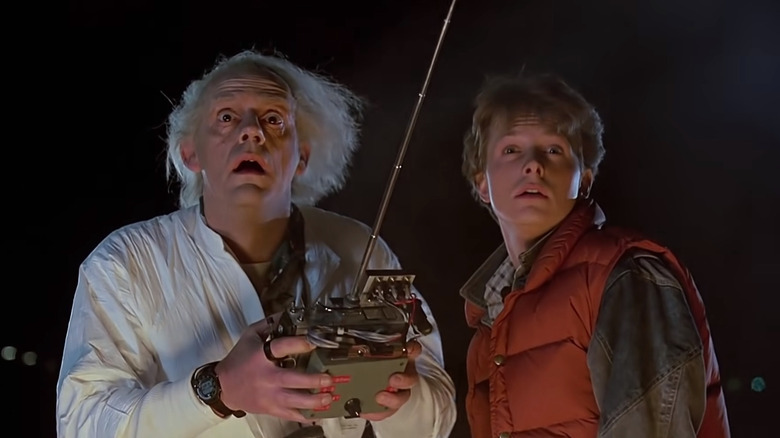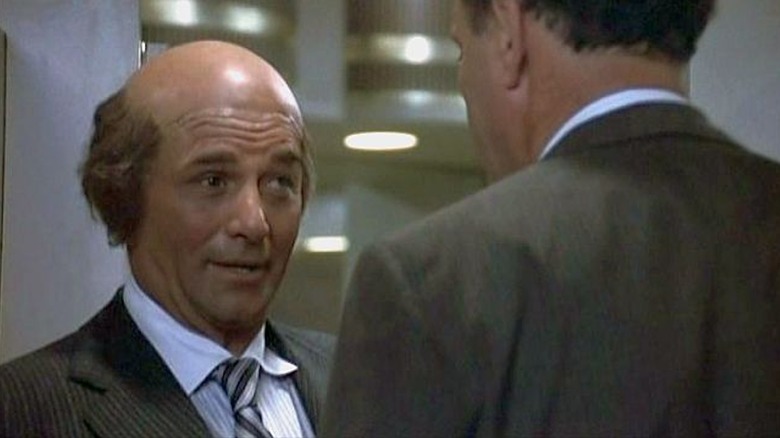Columbo's Peter Falk Starred In A Crime Comedy Saved By Back To The Future
Studio executives live in fear of passing on a blockbuster. Universal, Paramount and Disney all decided George Lucas' first "Star Wars" movie wasn't worth the risk (and, if not for Alan Ladd Jr., 20th Century Fox likely would've followed suit). Warner Bros. balked at the budget for "Home Alone," which allowed John Hughes to take the film to 20th Century Fox (though he made a boner himself by handing the directorial reins over to Chris Columbus). And then there was the time Columbia Pictures put "E.T. the Extra-Terrestrial" into turnaround. Though the studio had already spent around $1 million on the film's development, then CEO Frank Price soured on Steven Spielberg's project, deriding it as "a wimpy Walt Disney movie." Universal snatched the film up (though Columbia did wind up with 5% of the film's profits, which was not chump change), and Spielberg would go on to make only one more movie for Columbia (technically Sony via the disappointing "Hook").
This, of course, was back in the day when studios didn't churn out preordained blockbusters based on can't-miss intellectual properties. You had to place your trust in proven talent and hope that they'd keep the train on the tracks. I actually understand the hesitance with "Star Wars" to a degree (it was a throwback that went against the edgy "New Hollywood" grain), but WB grumbling over potential budget overruns on "Home Alone" (which would up costing a reasonable $18 million to make), or Columbia dicking Spielberg around on "E.T. the Extra-Terrestrial" as if he hadn't already knocked out two gargantuan blockbusters ("Jaws" and "Close Encounters of the Third Kind") with a third on the way ("Raiders of the Lost Ark"), is just preposterous.
Interestingly, Price learned his lesson from his "E.T." miscue. And when he left Columbia for the top perch at Universal, he savvily found a way to atone for his lack of faith in Spielberg. All he had to do was make a deal with his former studio that would enable a John Cassavetes film starring Peter Falk and Alan Arkin to move forward.
Columbia's disinterest in Back to the Future allowed Frank Price to strike a sweetheart deal
Andrew Bergman was a hot screenwriter in Hollywood during the 1980s. He was one of the credited scribes on Mel Brooks' "Blazing Saddles" and wrote the hilarious action-comedy hit "The In-Laws" for director Arthur Hiller. Even though his first outing as a writer-director, the gut-busting sex comedy "So Fine," was a box office bomb, studios were still eager to work with him.
A few years after "So Fine," Columbia Pictures took a shine to Bergman's screenplay for "Big Trouble," a comedic riff on Billy Wilder's masterful film noir "Double Indemnity." There was just one problem: The insurance-scheme plot was so similar to Wilder's movie that Columbia had to license the rights to the 1944 masterpiece in order to move forward. So, when Guy McElwaine, a powerful and well-liked talent agent who'd segued out of that business to become the new head of Columbia, sought to make a "Double Indemnity" deal with his friend Frank Price at Universal, the man who'd passed on "E.T. the Extra-Terrestrial" knew just what he wanted.
During his time at Columbia, Robert Zemeckis and Bob Gale pitched Price on "Back to the Future." He made a deal with the duo, but, after he left Columbia, the new regime let the finished Zemeckis-Gale screenplay gather dust. When Price learned that Spielberg was interested in producing "Back to the Future," he quietly strategized how he might wrest the rights to the script away from Columbia.
McElwaine's call couldn't have come at a more opportune time, and Price had his buddy just where he wanted him. As Price told Deadline in 2015:
"I got a call from a desperate McElwaine, saying I had to do him a favor. He told me that his lawyers had just told him that his film was in big trouble, a week away from starting production. 'You've got to give me a license for it,' he said. At that point, I didn't want to reveal how much I wanted 'Back to the Future,' so I said, let me think about it, and we'll speak tomorrow. I gave him the license. And then I said, 'Oh, by the way, there are a couple scripts I liked that you're doing nothing with that I'd love to have.' I didn't make it quid pro quo, I just asked, and I don't remember what the other script was. And we made a deal. He got the license for 'Double Indemnity,' and I got the one I wanted."
All Columbia got for letting Back to the Future go was Big Trouble
This proved to be a disastrous deal for McElwaine. "Big Trouble" got off to a rocky start in principal photography, which led to Bergman being replaced as director by John Cassavetes. I think Cassavetes was a genius, but "Big Trouble" was not ideal material for him. He made shaggy, unconventional indie movies, not broad studio comedies. But he was tight with Falk, so the studio gave him the gig.
Cassavetes came to regret this. Before his death in 1989, the actor-director would always refer to the film as "the aptly titled 'Big Trouble.'" He felt the studio kiboshed many of his best ideas and forced him to make the conventional comedy they'd hired him to make. Columbia's check cleared, so Cassavetes could only be so angry, but as his health declined, and it became clear this would be the last movie in his filmography, his hatred for "Big Trouble" only grew. (I remember the movie being lumpy, but funny in spots.)
"Back to the Future" encountered some turbulence in production as well (most notably, the firing of Eric Stoltz as hero Marty McFly after more than a month into shooting), but film went on to gross $385 million against a $19 million budget, launch a franchise, and become one of Universal's most valuable library titles. If nothing else, Price redeemed himself.


